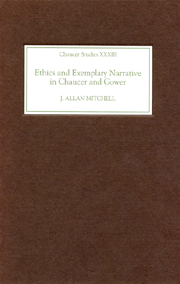Book contents
- Frontmatter
- Contents
- Acknowledgements
- Abbreviations
- Introduction
- 1 Reading for the Moral: Controversies and Trajectories
- 2 Rhetorical Reason: Cases, Conscience, and Circumstances
- 3 Gower For Example: Confessio Amantis and the Measure of the Case
- 4 All That Is Written For Our Doctrine: Proof, Remembrance, Conscience
- 5 Moral Chaucer: Ethics of Exemplarity in the Canterbury Tales
- 6 Pointing the Moral: The Friar, Summoner, and Pardoner's Satire
- 7 Griselda and the Question of Ethical Monstrosity
- Conclusion
- Bibliography
- Index
- CHAUCER STUDIES
3 - Gower For Example: Confessio Amantis and the Measure of the Case
Published online by Cambridge University Press: 12 September 2012
- Frontmatter
- Contents
- Acknowledgements
- Abbreviations
- Introduction
- 1 Reading for the Moral: Controversies and Trajectories
- 2 Rhetorical Reason: Cases, Conscience, and Circumstances
- 3 Gower For Example: Confessio Amantis and the Measure of the Case
- 4 All That Is Written For Our Doctrine: Proof, Remembrance, Conscience
- 5 Moral Chaucer: Ethics of Exemplarity in the Canterbury Tales
- 6 Pointing the Moral: The Friar, Summoner, and Pardoner's Satire
- 7 Griselda and the Question of Ethical Monstrosity
- Conclusion
- Bibliography
- Index
- CHAUCER STUDIES
Summary
Gower's Confessio Amantis is a veritable anthology of literary kinds, a miscellany of discourse both pragmatic and speculative, entertaining and edifying, as though its maker had aspired to join together all of the genres current in the later Middle Ages. In this respect it hardly differs from many other voluminous medieval works that combine so much “lust” and “lore.” But Gower's massive poem of more than 30,000 lines and about 110 exempla, spread liberally over eight books and a prologue, with accompanying Latin verse headings and marginal glosses, appears to spare nothing. The work puts itself forward as at once a Boethian consolation, Augustinian confession, and moralized (and just as often unmoralized) Ovid; and it compendiously incorporates elements of amatory lyric, allegory, satire and complaint, fabliau, mirror for princes, conduct book, debate poem, scholastic disputation, and dream vision – all within the frame of a mock-confession. And in the same spirit, individual tales within the larger fictional frame are seen to have classical, scriptural, and historical provenance. Doubtless further sources of inspiration could be catalogued, but at last what is important to remark about the work is how its very inclusiveness and superabundance might signify something in its own right.
The very scale of Gower's encyclopaedic enterprise, which the most assiduous readers have found difficult to harmonize into a coherent normative signification, remains a curious textual fact in light of Gower's reputation for moral conservatism and restraint. There seems to be little moderation in evidence here, at least not on the compositional side of things where a sheer plenitude of narrative materials overlaps and collides with one another.
- Type
- Chapter
- Information
- Ethics and Exemplary Narrative in Chaucer and Gower , pp. 36 - 60Publisher: Boydell & BrewerPrint publication year: 2004



